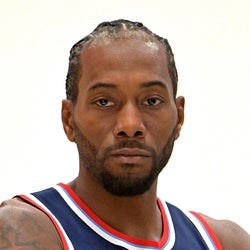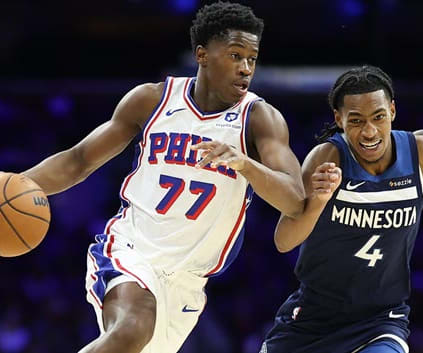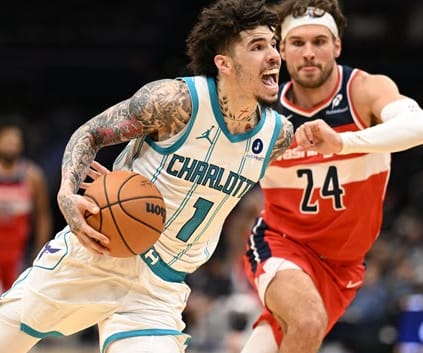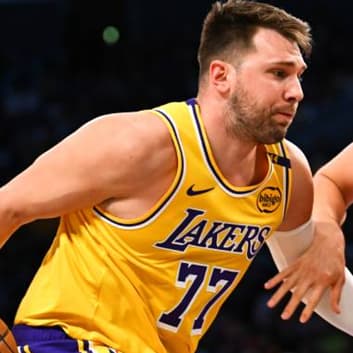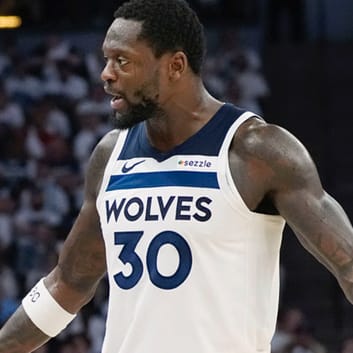2025 Stats
PTS
23.8
REB
6.0
AST
3.4
STL
2.2
BLK
0.4
ROS Projections
2025 Fantasy Outlook
The oft-injured Leonard made only 37 regular-season appearances last year, the second fewest in his career. His fewest came in 2017-18, when he appeared in only nine during his final year with the Spurs. Leonard has never been fully healthy, failing to crack 70 regular-season appearances in each season since 2014-15. However, the veteran superstar has still been able to deliver quality fantasy campaigns when he plays in enough games, proving time and time again that he can rebound from even the most devastating of injuries. Across five years in Los Angeles, Leonard has finished inside the top 25 in eight-category leagues three times. Despite the lack of regular-season games in 2024-25, Leonard actually finished the campaign healthy and playing extremely well. During a seven-game playoff series versus Denver, Leonard averaged 25 points, eight rebounds, five assists and nearly two stocks in 38 minutes per game while posting 54/78/40 shooting splits. A healthy offseason should bode well for Leonard's early-season outlook, but it would be shocking if he weren't monitored and/or limited, especially during back-to-back sets. The team around him has also been revamped, with the Clippers adding Brook Lopez, Chris Paul and John Collins while replacing Norman Powell with Bradley Beal. Los Angeles will certainly have to play games without Leonard next season, and James Harden has proven he's still capable of picking up the slack, but when Leonard is on the court, there are few players in the league who rival his impact. Read Past Outlooks

Strikes for game-high 34 on Friday
Leonard closed with 34 points (11-16 FG, 5-8 3Pt, 7-7 FT), five rebounds, five assists and six steals in 36 minutes during Friday's 126-124 win over the Pelicans.
ANALYSIS
The 34 points led all scorers on the night and were a season high for Leonard. The 34-year-old has stayed healthy to begin the season, averaging 32.8 minutes while starting all five of the Clippers' games. If he's distracted by all the off-court controversy surrounding him, he isn't letting it show, producing 23.8 points, 6.0 boards, 3.4 assists, 2.4 threes, 2.2 steals and 1.2 blocks a contest. Leonard also said that he plans on playing both halves of the Clippers' upcoming back-to-back set.
The 34 points led all scorers on the night and were a season high for Leonard. The 34-year-old has stayed healthy to begin the season, averaging 32.8 minutes while starting all five of the Clippers' games. If he's distracted by all the off-court controversy surrounding him, he isn't letting it show, producing 23.8 points, 6.0 boards, 3.4 assists, 2.4 threes, 2.2 steals and 1.2 blocks a contest. Leonard also said that he plans on playing both halves of the Clippers' upcoming back-to-back set.
NBA Per Game Stats
Per Game
Total
Per 36
NBA Per Game Stats
Loading Per Game Stats...
2025 NBA Game Log
2025
2024
2023
2022
2020
2019
2018
2017
2016
2025 NBA Per Game Split Stats
Schedule
By Month
Starting/Off Bench
Days Rest
Vs Opp
By Result
2025 NBA Per Game Split Stats
Loading Split Stats...
Advanced Stats
Loading Advanced Stats...
Stat Review
2025
2024
2023
2022
2020
2019
2018
2017
2016
How does Kawhi Leonard compare to other players?
This section compares his stats with all players from the previous three seasons (minimum 200 minutes played)*. The bar represents the player's percentile rank. For example, if the bar is halfway across, then the player falls into the 50th percentile for that stat and it would be considered average.
True Shooting %
57.0%
Effective Field Goal %
52.2%
3-Point Attempt Rate
27.9%
Free Throw Rate
22.1%
Offensive Rebound %
2.9%
Defensive Rebound %
17.6%
Total Rebound %
10.9%
Assist %
16.4%
Steal %
1.7%
Block %
1.7%
Turnover %
7.4%
Usage %
28.2%
Fantasy Points Per Game
36.8
Fantasy Points Per Minute
1.1
NBA Historical Fantasy Stats
Historical ADP
Loading Historical ADP...
Clippers Depth Chart
Our full team depth charts are reserved for RotoWire subscribers.
Subscribe Now
Clippers Rotation: Minutes Breakdown
Loading Clippers Rotation Data...
Average Fantasy Points
Minutes
FanDuel
DraftKings
Yahoo
FantasyDraft
Head2Head
Sorare
Average Fantasy Points are determined when Kawhi Leonard was active vs. non-active during the season. Click here to view average fantasy points for a different time period.
Loading Average Minutes...
Past Fantasy Outlooks
2024
2023
2022
2021
2020
2019
2018
2017
2016
2015
2014
2013
2012
2011
Leonard played in 68 regular-season games last year, his most since making 74 appearances with San Antonio during the 2016-17 season. As usual, the veteran was a consistent producer, averaging at least 23.5 points, 6.0 rebounds, 3.0 assists and 1.4 steals for a fifth straight campaign -- Leonard missed 2021-22 rehabbing from an ACL injury. In those five seasons, the superstar forward has finished inside the top 22 in eight-category leagues four times, including an 11th-place finish in 2023-24. However, once again, Leonard suffered a knee injury during the postseason, putting his status for the start of 2024-25 in question. He was practicing with Team USA ahead of the 2024 Paris Olympics but had to withdraw before the exhibition showcase began. It was revealed in late September that Leonard had undergone offseason surgery and would be limited to start camp, making his return for the start of the year murky. With Paul George in Philadelphia, Leonard and James Harden will assume leading roles for the Clippers, who may struggle to flirt with contender status in a loaded Western Conference.
More Fantasy News

Double-doubles in win over Portland
Leonard produced 30 points (11-21 FG, 4-6 3Pt, 4-4 FT), 10 rebounds, four assists and two steals across 35 minutes during Sunday's 114-107 win over Portland.
ANALYSIS
Subscribe now to instantly reveal our take on this news.
Subscribe now to instantly reveal our take on this news.

Dazzles with 27 points in blowout
Leonard closed with 27 points (11-21 FG, 1-4 3Pt, 4-5 FT), five rebounds, five assists, one block and one steal over 33 minutes during Friday's 129-102 victory over the Suns.
ANALYSIS
Subscribe now to instantly reveal our take on this news.
Subscribe now to instantly reveal our take on this news.

Struggles in season opener
Leonard closed Wednesday's 129-108 loss to the Jazz with 10 points (3-9 FG, 1-5 3Pt, 3-3 FT), four rebounds, two assists, one block and one steal in 29 minutes.
ANALYSIS
Subscribe now to instantly reveal our take on this news.
Subscribe now to instantly reveal our take on this news.

Quiet in season-opening loss
Leonard generated 10 points (3-9 FG, 1-5 3Pt, 3-3 FT), four rebounds, two assists, one steal and one block over 29 minutes in Wednesday's 129-108 loss to Utah.
ANALYSIS
Subscribe now to instantly reveal our take on this news.
Subscribe now to instantly reveal our take on this news.

Off injury report for Opening Night
Leonard (rest) isn't listed on the Clippers' injury report for Wednesday's game against the Jazz.
ANALYSIS
Subscribe now to instantly reveal our take on this news.
Subscribe now to instantly reveal our take on this news.
Latest Fantasy Rumors

Gets accolades from Harden
James Harden said Saturday that Leonard has looked sharp at training camp, independent NBA writer Justin Russo reports.
ANALYSIS
"He looks to in season-form," Harden said. "He's been working all summer. He's been aggressive and he looks like Kawhi, which is beneficial for our team." Leonard has been in the headlines for another reason due to his link to a fraudulent tree-planting company named Aspiration, but at least on the court, things appear to be going well. His injury history is well documented, but it sounds like he's had no setbacks during the offseason and is on track to be at full health for Opening Night.
"He looks to in season-form," Harden said. "He's been working all summer. He's been aggressive and he looks like Kawhi, which is beneficial for our team." Leonard has been in the headlines for another reason due to his link to a fraudulent tree-planting company named Aspiration, but at least on the court, things appear to be going well. His injury history is well documented, but it sounds like he's had no setbacks during the offseason and is on track to be at full health for Opening Night.


